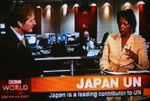Is Japan's Bid for a Permanent UN Security Council Seat Realistic?
Martine Dennis (Presenter, BBC News)
Sean Curtin (Fellow, GLOCOM and Asia Times)
 The following discussion is about the speech Prime Minister Junichiro Koizumi gave at the United Nations General Assembly outlining Japan's hopes for gaining permanent membership of the UN Security Council. The address was delivered in English in New York on 21 September 2004. The following discussion is about the speech Prime Minister Junichiro Koizumi gave at the United Nations General Assembly outlining Japan's hopes for gaining permanent membership of the UN Security Council. The address was delivered in English in New York on 21 September 2004.
Martine Dennis: The proposed enlargement of the United Nations Security Council has been discussed for at least a decade or so. In order for it to actually occur, it has got to have the agreement of the big five permanent members, the United States, United Kingdom, France, China and Russia. What is the position of these separate countries?
Sean Curtin: I think you have identified the key problem with the initiative. Japan is very keen to get a permanent seat on the Security Council and has been trying for a long time. They have invested a lot in Africa and are the second largest contributor to the UN. However, the basic problem seems to be amongst the five permanent Security Council members. There is no actual consensus on the best way to move the process forward. When you speak to senior diplomats and figures at the UN, there is definitely momentum for some kind of change, but the problem is there is actually no consensus about what kind of change it should be. Behind the scenes, we also see that some of the permanent members are not very enthusiastic about the idea of them giving up some of their present power. I would also say that in relation to Japan's bid for a permanent seat, China, not officially but unofficially, is definitely not happy about the idea. There is a lot of talk about this in the Chinese press and most of it is negative. The Chinese public does not seem to be very happy about the idea of Japan gaining a permanent membership.
Martine Dennis: How much willingness is there amongst the Japanese public about the potential fallout of Japan taking on such a high profile role on the international stage? The Japanese were quite phased by their casualties in Iraq, weren't they?
 Sean Curtin: That is a very good point that you have made. I think it is a very delicate balancing act that Prime Minister Koizumi is attempting. Interestingly, we saw in the speech he gave to the UN in English that he shifted his own policy position. Basically, he has now accepted that Japan does not have to change its war-renouncing constitution before becoming a permanent member of the Security Council. Previously, he had indicated he wanted to. So, I think this shift will assuage some of the anxiety ordinary people might feel about this. But generally speaking, increased Japanese activity in the UN is seen as very positive in Japan. Also, Japanese troops have not actually suffered any casualties in Iraq. There were some Japanese diplomats that were murdered which caused a lot of anxiety in Japan. I think generally, Japanese people are very keen to expand their role in the UN. As you say, they do not really want to get involved in any military role. Koizumi actually underlined that point in his speech. Sean Curtin: That is a very good point that you have made. I think it is a very delicate balancing act that Prime Minister Koizumi is attempting. Interestingly, we saw in the speech he gave to the UN in English that he shifted his own policy position. Basically, he has now accepted that Japan does not have to change its war-renouncing constitution before becoming a permanent member of the Security Council. Previously, he had indicated he wanted to. So, I think this shift will assuage some of the anxiety ordinary people might feel about this. But generally speaking, increased Japanese activity in the UN is seen as very positive in Japan. Also, Japanese troops have not actually suffered any casualties in Iraq. There were some Japanese diplomats that were murdered which caused a lot of anxiety in Japan. I think generally, Japanese people are very keen to expand their role in the UN. As you say, they do not really want to get involved in any military role. Koizumi actually underlined that point in his speech.
Martine Dennis: It is interesting that Japan has a war-renouncing constitution which prevents it from engaging in overseas military activities. So, how on earth could it really contribute on a level playing field with the other permanent members of the Security Council if it doesn't change its constitution?
Sean Curtin: Well, actually, I think that recent events such as Japan sending troops to Iraq in January may have helped solve this. Basically, Japanese troops in Iraq are there in a non-combat role in what is effectively a combat zone. So, I think that Prime Minister Koizumi believes Japan has actually reached a position where it can effectively participate in major international conflicts in a strictly humanitarian and non-combat role. So, I believe the concerns you mention are perhaps somewhat overplayed. I think it is a delicate balancing act, but I feel Koizumi has hit all the right buttons and I also believe the public is generally behind this move.
Martine Dennis: Well, we shall see.
The above discussion was originally broadcast on BBC World's Asia Today programme on 22 September 2004.
| 




